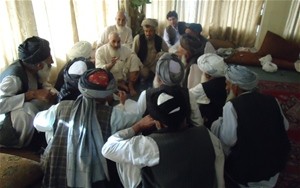
Tribal elders involved in dispute resolution meet with Shah Mohammad Khan, the district governor of Arghandab District, to discuss interactions between the formal and informal justice sectors.
RLS-I/Checchi/USAID
USAID promotes dialogue between district elders and the state to streamline justice systems
24 JULY 2011 | KANDAHAR, AFGHANISTAN
Ongoing conflict has caused a gradual deterioration of Afghanistan’s state justice system. Despite this, Afghans have retained a centuries-old informal justice system that is based on deliberation and decisions between elders at localized levels.
Informal justice systems, however, are not standardized in how they deliver justice, as the elders who manage them often have little or no formal training in law, and limited interaction with the state, or formal sector.
Since October 2010, USAID has sponsored 245 events for more than 10,000 participants from different communities, tribes, and government institutions aimed at bridging the gap between Afghanistan’s informal and formal justice systems.
Events encompass workshops with respected university teachers on Afghan and Islamic law, discussion groups that analyze the current legal environment in Afghanistan, and network meetings that bring together elders from different districts and tribes to encourage partnerships in dispute resolution.
“It is difficult for the government to provide justice in rural areas of my country so we have no choice but to rely on traditional elders to seek solutions. USAID events are helping us to meet with the state justice providers to seek ways to work together. We are now on the same page, working for one goal and purpose,” said one Arghandab District elder.
A recent survey with elders from Arghandab District in Kandahar Province indicated that USAID workshops, events, and discussion groups contributed significantly to building trust between government and the community.
Most respondents said there are closer ties between the formal and informal systems today than there were six months ago as a result of USAID activities. With a better understanding of the law, elders are more willing to send civil cases back to the courts. In return, the courts are now sending more dispute cases to the elders.







Comment
Make a general inquiry or suggest an improvement.